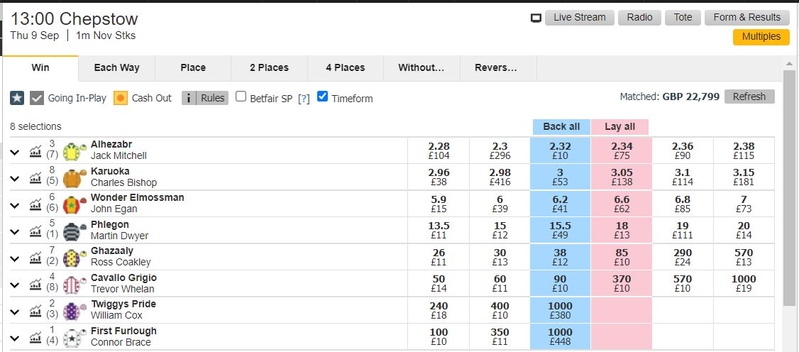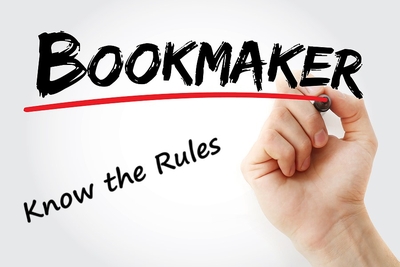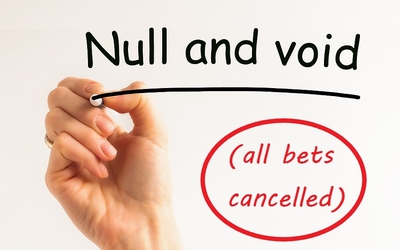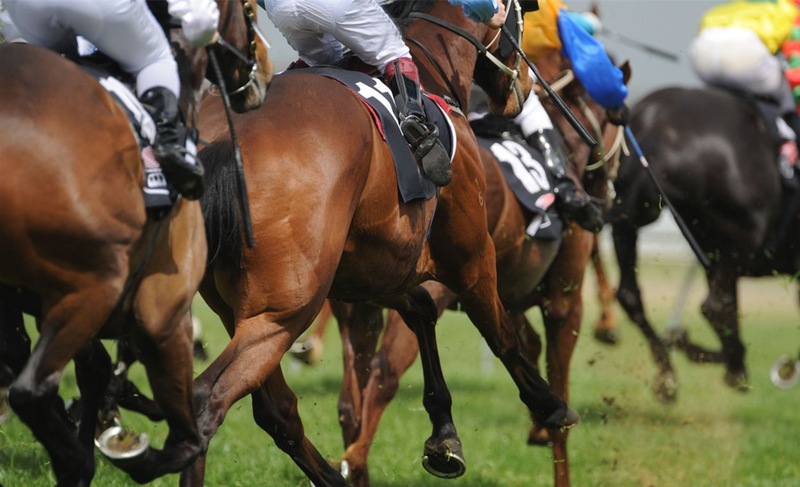 Arbitrage is actually a term derived from the world of the financial markets and economics and in very simple terms is a way of using price differences between markets to get a positive return. For example, if you could buy gold for $1000 an ounce and instantaneously sell it for $1050 there is a $50 difference in your favour, so long as you have a buyer and a seller at that price.
Arbitrage is actually a term derived from the world of the financial markets and economics and in very simple terms is a way of using price differences between markets to get a positive return. For example, if you could buy gold for $1000 an ounce and instantaneously sell it for $1050 there is a $50 difference in your favour, so long as you have a buyer and a seller at that price.
In the world of gambling it works in a very similar fashion and arbitrage betting (also known as arbing) is taking odds on both outcomes but only when the prices mean that the return from the winning bet would cover both of the stakes. Imagine a two horse race where one bookie thinks Daring Dave will win and as such price their second favourite, Bonkers Bob, at 21/20. However, another bookie thinks Bonkers Bob is the favourite and they offer odds of 21/20 on Daring Dave instead. If you bet £20 on each horse (so £40 in total), then no matter what happens you will lose £20 on one side but get a return of £21 on the other (plus your £20 stake). That leaves you with £41 whoever wins.
Of course, that is a hugely simple example and you would rarely, if ever, find such a straightforward arbing opportunity. More commonly one or more bookmaker may be slow to react to a change in the market and their out-of-line price will facilitate an arb. For example, say the day before a Test match the weather forecast changes from five days of sun to three days of showers and two days of downpours. If the draw was originally priced at odds of 3/1 it may now be priced at evens given the new forecast.
If the bookie is aware of this forecast early they will change their odds accordingly but more than likely a canny bettor or two will hear first and will place large bets on the draw at the excellent price of 3/1. This forces the odds down and may raise alarm bells with the bookie who then sees the forecast and changes the odds. Not all bookmakers will react at the same time however and the devices that will probably react quickest are the betting exchanges because they have thousands of eyes monitoring them, unlike the bookmaker. And so an arb is born…
Laying or Dutching

Laying is using a betting exchange to bet against an outcome, Dutching is using other bookmakers and/or the exchanges to back all available outcomes.
One can be clever about the above situation by backing the draw where it is available at 3/1 and then either laying the draw at a betting exchange, perhaps at 5/4 or by Dutching it with other bookmakers who have changed their draw price to evens but now consequently have the two other sides at far higher odds.
Problems and Risks with Arbing
- Arbs are not easy to find and don’t last long because more and more people are looking for them and snapping them up in double quick time
- Bookmakers are quick to limit and ban people who bet on their out-of-line prices
- You need a large amount of cash for a small return and one mistake or typo can be extremely costly
- Odds can change quickly and what is at one moment an arb can quickly become a loss-making bet
Be Careful: Different Bookies Have Different Rules
 When you are making arbitrage bets, whether it is through laying at an exchange or Dutching using different bookies, the process relies on the fact that you are covering every possible outcome. Your bet, or at least one of them, must win because you have all the results covered, if you miss out even one outcome then you are leaving yourself dangerously exposed.
When you are making arbitrage bets, whether it is through laying at an exchange or Dutching using different bookies, the process relies on the fact that you are covering every possible outcome. Your bet, or at least one of them, must win because you have all the results covered, if you miss out even one outcome then you are leaving yourself dangerously exposed.
The most common area in which you might come a cropper comes when something unforeseen occurs and there is a negative clash between the rules of the exchange and the bookie, or the two bookmakers. The classic example of this is the rules relating to player retirement in a tennis match. If a player retires injured during the game different betting sites use different rules to determine what happens to the bet.
The most common rules are:
- One set complete – bets stand if one set has been completed, otherwise they are voided
- Match complete – any retirement at all causes the bet to be void
- Ball served – as long as a ball is served, bets stand: in other words, once the match starts, all bets will count
If the rules at bookie one and bookie two/the betting exchange are the same then you can safely go ahead and place your arb. In the relatively unlikely but far from unheard of event that a player retires, whatever happens to one part of the bet will also happen to the other. This means that no matter when or how the retirement comes, either both of the bets will be voided and you will get both stakes back, or both will be settled as normal and the arb will play out as expected, despite the match not doing so.
How to Handle Void Bets
 If you want to play things safe then you should always use sites with “matching” rules. However, if you can’t find two bookies with matching rules then there is a slightly more advanced technique that you might choose to employ once you are really comfortable with arbing on tennis. It entails risk but the risk to reward ratio is in your favour, and the financial difference can be significant in some cases.
If you want to play things safe then you should always use sites with “matching” rules. However, if you can’t find two bookies with matching rules then there is a slightly more advanced technique that you might choose to employ once you are really comfortable with arbing on tennis. It entails risk but the risk to reward ratio is in your favour, and the financial difference can be significant in some cases.
If you are backing the favourite in a game at short odds, especially if they are very short, then your financial risk on this player will be high. Let us imagine one player is priced at odds of 1/5 (1.2) and the other at 6/1 (7.0). Placing £85.37 on the favourite and £14.63 on the underdog gives you a positive difference of £2.44 either way. In this position, you want to have the larger stake being most likely to be voided.
Let’s imagine you back the favourite with a bookie that only allows bets to stand where the game is complete, whilst the underdog is backed with a site where bets stand as soon as a ball is served. Any retirement is going to see the bookies apply different rules, but on average (assuming both players have a roughly 50% chance of being the one to retire) this might actually work in your favour.
This is because if the favourite retires you will see that £85.37 wager voided and get your stake back. In contrast, your much smaller bet of around £15 is with a ball-served bookie so this bet will stand, and if your player didn’t retire they are classed as winning the match so your bet delivers £87.78. Instead of clearing £2.44, you have made £87.78.
Let us now imagine the reverse scenario where it is the underdog that retires. Once again, you get the lion’s share of your overall outlay back as the site where you backed the favourite voids bets unless the match is complete. You get your £85.37 stake back. The other site allows your bet to stand and as that player retired, you are out of pocket to the tune of a little under £15.
OK, so in this second scenario you have lost money, but if we assume both players have a roughly equal chance of retiring then 50% of the time you are winning almost £90, whilst 50% of the time you are down less than £15. We like those numbers.
That said, it should be noted that some players are more prone to retiring than others and, as a very general rule, the top players retire less frequently than the lower-ranked ones. You should also factor in rumours of players carrying a minor knock or being ill but overall, this is an arbing strategy that many arbitrage experts favour.
Disqualification
 Almost all betting sites treat disqualifications in the same way and settle wagers on the player who progressed as winning bets.
Almost all betting sites treat disqualifications in the same way and settle wagers on the player who progressed as winning bets.
However, we have heard of some sites that void bets when a player is disqualified. This is another thing to factor into your awareness of the rules when it comes to arbing.
That said, disqualifications in professional tennis are incredibly rare. At the time of writing, there have been fewer than 30 players disqualified across both the men’s and women’s games. Whilst nine of those have occurred solely on the ATP Tour since 2016, it remains a very uncommon incident and one that arbers need not be overly concerned by.
Even so, if you want to be extra safe, it might be worth checking the rules at both of the sites you are using for your arb.
Other Rules Of Note
There are potentially any number of unlikely events in almost all sports that could create a rules clash between the two (or more) parts of your arb or Dutch. Mostly these might concern postponed or abandoned fixtures, where one site allows a bet to stand if the fixture is replayed whilst the other voids it. In this, and most other similar scenarios, however, you will have the chance to make another bet to cover yourself, so this is not quite the same as with tennis retirement.
Other possible issues might arise where there is a dispute over the result or over who scored a goal, though in both instances the officially declared outcome at the time is almost universally used. It is not impossible that a clash could cost you but with such strange scenarios very rare, and the vast majority of bookmakers using the same rules for most of these sorts of situations, most arbs should work out as planned.
Is Arbing Illegal?
 Arbing is in no way, shape or form illegal and there is categorically nothing to fear on that front. As long as you comply with standard gambling restrictions in whatever country you live in, for example that you are aged 18 or over in the UK, then everything is fine. In essence, all you are doing is making standard bets at different bookies and so there really is nothing to worry about.
Arbing is in no way, shape or form illegal and there is categorically nothing to fear on that front. As long as you comply with standard gambling restrictions in whatever country you live in, for example that you are aged 18 or over in the UK, then everything is fine. In essence, all you are doing is making standard bets at different bookies and so there really is nothing to worry about.
People have been arbing and using these sorts of techniques for decades now so any guilty nightmares you’re having about being arrested are unfounded. What’s more, in the UK at least, any winnings from arbing are totally tax free as they are classed as normal gambling monies, even though advocates would not say they are really gambling at all.
Whilst some bookies may insert vague terms and conditions aimed at outlawing tactics or techniques that attempt to get one over on them, in general these are referring to bets placed solely with them and, more importantly, such Ts and Cs are not legally enforceable. If you choose to place bet A with one site and bet B with another that is entirely down to you and there is absolutely no way you can get into any sort of legal trouble for doing this.
Slightly more of a grey area concerns more flagrant breaking of standard terms and conditions regarding opening multiple accounts with a particular betting site or placing bets for other people (or getting them to do so for you). Many people who regularly place arbs will see their accounts closed or limited. Not because they are doing anything illegal but because in general, over time, such bets tend to cost the bookmaker money. When a bookmaker notices a costly customer, they are within their rights to limit their account or refuse service altogether. To get around this, many arbers attempt to open multiple accounts.
They may do this by slightly altering their name, address or date of birth (though modern ID checks should pick this up), by opening accounts in the names of their family and friends (with their knowledge and permission), or even by “buying” accounts. Whilst all and any of these would be a clear breach of the bookie’s Ts and Cs, it is highly unlikely they would ever result in any form of legal proceedings. The most likely cause of action would be that the relevant accounts would be closed but that assumes the bookie is able to “catch” the person anyway.
We would never recommend anyone opens multiple accounts in this way or breach bookmaker terms though. However, there is very little a bookie can do to prevent those that do choose to be dishonest. The important point here though, is that if you play entirely by the rules and strictly only use your own accounts to arb with, then not only are you definitely not doing anything illegal but you are also not breaking any terms to which you have signed up when joining a betting site.
Do Bookies Care About Arbitrage Betting?
 If, as we have said above, people making arbitrage bets are essentially making bets just like anybody else and doing nothing illegal, and assuming they are not opening accounts for their third cousin, his pet dog and the garden gnome as well, one might well ask if bookies care about people who arb or even notice it is happening. They must do, because as we have stated above, people who make arbitrage bets do tend to have their accounts limited (their maximum stake on a bet reduced to a few pounds) and eventually closed entirely. So why is that?
If, as we have said above, people making arbitrage bets are essentially making bets just like anybody else and doing nothing illegal, and assuming they are not opening accounts for their third cousin, his pet dog and the garden gnome as well, one might well ask if bookies care about people who arb or even notice it is happening. They must do, because as we have stated above, people who make arbitrage bets do tend to have their accounts limited (their maximum stake on a bet reduced to a few pounds) and eventually closed entirely. So why is that?
As a general rule, it is considered that arbs are often also value bets. These are bets where the odds are higher than they probably should be based on the likelihood of them winning. So if a bet has a 50% chance of winning, odds of greater than evens are considered to be a value bet. Punters who consistently make such wagers will cost the bookie money in the long run.
Let us imagine that you have found Man United at odds of 11/10 with a bookmaker but the Red Devils can be layed at a betting exchange at 1.98, or a shade under evens. Because exchanges have no real margin, commission aside, they’re often considered to represent the true odds of an outcome. The power of market forces, combined with the wisdom of crowds, mean that many believe the odds at the major exchanges are about as close as we can get to learning the true probability of an outcome occurring.
As such, there is a fair chance that when you are backing a selection at odds greater than the exchange, it is a value bet. Given that the chances are such a wager will affect the bookies’ margin, they are not keen on customers who only, or mainly, place such bets. Whether you think it is fair or right or proper, bookmakers like punters who lose and in particular ones who place bets that offer very bad value. Backing accas at 100/1 that should really be closer to 200/1, or taking specials on hugely unlikely scenarios that sound far more likely to occur than they really are will enamour you to a bookmaker. In contrast, hitting them when their odds are too big will not.
In addition, customers who place arbitrage bets will also tend to utilise whatever free bets, offers and bonuses a bookie offers. Many of these can be used by savvy gamblers to give them an edge over the bookmaker in the long run. In short, people who tend to make arbitrage bets turn the tables on the betting site. The operator wants customers who lose but the cunning arber takes rather than gives. They only bet when the odds are high or when offers tip things their way, and in simple terms they tend to be fruitless for a bookmaker.
Can You Avoid Being Spotted As An Arber?
 Ultimately if you place a lot of bets that are good value and you are affecting the bookmaker’s bottom line it is very hard to avoid being limited or banned. When a bookie “catches” you arbing, or suspects that is what you are doing, that is what will happen.
Ultimately if you place a lot of bets that are good value and you are affecting the bookmaker’s bottom line it is very hard to avoid being limited or banned. When a bookie “catches” you arbing, or suspects that is what you are doing, that is what will happen.
There will be no threat of legal action, no suggestion that they can deny you legitimately garnered winnings and no heavies sent to your door. You will simply find that either your maximum stake is reduced to a paltry level or that you get an email saying that for commercial reasons they will no longer be accepting your bets and your account is being closed. Usually the former precedes the latter, but not always.
There is much discussion between arbers online about how to fly under the radar. Eventually you will be noticed, with the technology employed by bookies often easily able to spot when a customer is betting when their odds are out of line (too high), or if a punter only makes a certain type of bet. However, there are certain things that can be done that might prolong your account a little and these include:
- Betting on mainstream markets – a bet on a Premier League football match is less likely to attract attention that a bet on Polish handball
- Staking in round figures – your arb spreadsheet may recommend a stake of £198.64 to maximise and equalise returns but a bet of £200 is far more “normal” in the eyes of the bookmaker
- Mix in some “mug” bets – as well as your arbs, throw in the odd acca, a bit of casino play and some bet builders
- Leave your balance – rather than withdrawing winnings all the time, leave your balance with the site
- Don’t maximise all offers and arbs – if the maximum free bet with an offer is £100, sometimes only use £50, likewise placing smaller stakes on arbs might help
With regards to this last point, there are very much two schools of thought.

One could be described with the aphorism that ‘you can shear a sheep many times but you can skin it only once’. Some feel it is better to take regular smaller wins that will not draw attention to yourself and in this way prolong the lifespan of your account with any given bookie.
An alternative theory with an equally non-vegan, animal-based, saying, is that ‘you may as well get hung for a sheep as a lamb’. Why it is always sheep on the receiving end of these metaphors is a conversation for another day, but advocates of this style of arbing would say that you are going to get restricted and banned anyway, so make sure that it is worth it when you do. Don’t bother with small arbs that are only worth a few quid and instead make sure that you go out with a bang with a bet that is worth losing your account over.
A third way might suggest that these two theories are more alike than they seem at first. Given you can indeed skin a sheep only once, you have to make sure that when you do, it is worth it. So, for example, if you are going to place a bet on Lithuanian basketball that is almost certain to see your account closed, make sure the arb is big enough that it makes sense. However, before that point, smaller bets on more mainstream sports and markets could make sense.
Examples Of Arbitrage
Hopefully by this stage, you fully understand what an arb is and how the theory works. However, just to round this piece out and for the absolute avoidance of doubt, here are a couple of examples. The first is a simple arb, where you back a selection at a bookmaker and then lay that same selection at an exchange. The second is a slightly more complex Dutch, where you are backing all three horses in a particular race.
Simple Arb

Let us imagine that Real Madrid are hosting Barcelona in La Liga and you have spotted that one bookmaker has the Galacticos at longer odds than everyone else. Perhaps some new team news about a couple of injured Barca players has come out and whilst most sites have cut the price on Madrid to reflect this, one has not yet done so. Whilst most bookmakers price the side from the capital at 5/4, you have found them available at a far more generous price of 6/4. You then also notice that at your preferred exchange they are priced at 2.30, or 13/10, to lay, rather than back.
| – | Decimal Odds | Fractional Odds |
|---|---|---|
| Best odds any bookie | 2.5 | 6/4 |
| Widely available odds | 2.25 | 5/4 |
| Lay price at exchange | 2.30 | 13/10 |
There is, of course, a small commission, let’s say 5%, to pay on winnings at the exchange but even so, it is fairly clear that if you can back a selection at 2.5 and back against it at 2.3, there is a decent margin. Let’s say you decide to really go for it and bet £1,000 on Real Madrid at 6/4. This is a huge game and a very standard sort of market, so most bookies would allow unlimited customers to make such a bet.
If Real win, you will win a very nice £1,500. However, should they lose, as things stand, you would be £1,000 down. So now you need to calculate how much you need to lay at the exchange in order to achieve the desired result. Thankfully there are spreadsheets (available free online) that allow you to do this very easily, simply by imputing the relevant values.
Using these, we can calculate that if you lay £1,111.11 at the betting exchange, you will have an equal return whether Real Madrid win or do not win (for the purpose of this arb it makes no difference whether they draw or lose). If Real fluff their lines and fail to win, you will lose £1,000 to the bookie but will win £1,111.11 at the exchange. After 5% commission, that becomes £1055.55, leaving an excess of over £55.
On the other hand, should Los Blancos win you will win £1,500 from the bookmaker but have to pay out at odds of 2.3 on a value of £1,111.11. That equates to £1,444.44 going out, meaning that once again there is a positive difference of just over £55 (it will be £55.56 if Real win and £55.55 if they do not).
3-Way Dutch Arb

Let us now consider a slightly more complex type of arbitrage betting whereby you are backing all of the runners in a three-horse contest. For whatever reason, let us imagine that the best odds on all three runners are with three separate bookmakers and are as follows:
- Horse 1 is priced at 2/1 (3 in decimal odds)
- Horse 2 is priced at 6/4 (2.5 in decimal)
- Horse 3 is priced at 4/1 (5 in decimal)
You might decide that you want to bet a total of £100 and, again, using a very simple online tool, you can calculate that you must stake the following:
- £35.71 on Horse 1 at 2/1 returns £107.13 including your stake
- £42.86 on Horse 2 at 6/4 returns £107.15
- £21.43 on Horse 3 at 4/1 returns £107.15
So Dutching these three horses with a total stake of £100 will return around £107 no matter which of the three crosses the line first. That’s a £7 difference, and you can move on to your next arb with a spring in your step.
